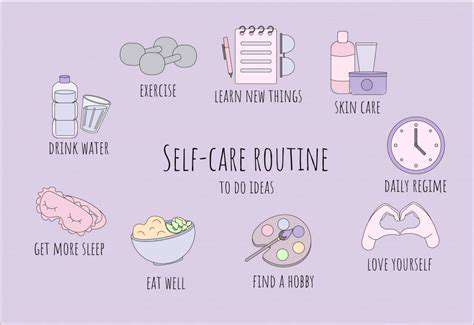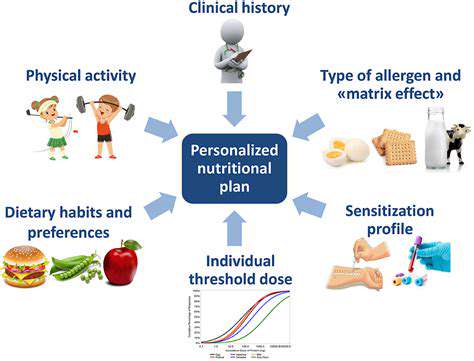10 Simple Healthy Habits to Start Today
Prioritize Sleep: Aim for 7-9 Hours
Prioritizing Sleep for Overall Well-being
Getting enough sleep is a cornerstone of a healthy lifestyle, yet it's often overlooked. Prioritizing sleep isn't just about feeling rested; it's a critical component for physical and mental health. Adequate sleep allows your body to repair and rejuvenate, boosting your immune system, improving mood regulation, and even aiding in weight management. A consistent sleep schedule, even on weekends, helps regulate your body's natural sleep-wake cycle, leading to more restful and restorative sleep. Studies have consistently shown a strong correlation between sufficient sleep and improved cognitive function, including memory, concentration, and decision-making abilities. By making sleep a priority, you're investing in your overall well-being and setting the stage for a healthier, happier you.
A lack of sleep can lead to a cascade of negative effects. It can impair your judgment and reaction time, increasing your risk of accidents. It can also affect your emotional regulation, making you more prone to irritability and stress. Chronic sleep deprivation can contribute to serious health problems, such as high blood pressure, heart disease, and diabetes. Prioritizing sleep, therefore, is not just a feel-good practice; it's a vital step towards protecting your long-term health and well-being.
Establishing a Consistent Sleep Routine
Developing a consistent sleep schedule, even on weekends, is crucial for regulating your body's natural sleep-wake cycle. This internal clock, known as your circadian rhythm, plays a vital role in your overall health and well-being. Going to bed and waking up around the same time each day, even on days off, helps to reinforce this rhythm, making it easier to fall asleep and wake up feeling refreshed. Creating a calming bedtime routine can also signal to your body that it's time to wind down. This might include taking a warm bath, reading a book, or practicing relaxation techniques like deep breathing exercises. Avoid screen time close to bedtime, as the blue light emitted from electronic devices can interfere with melatonin production, a hormone essential for regulating sleep.
Consistency in your sleep routine is key. Your body thrives on predictability, and a regular sleep schedule helps it anticipate when it's time to rest. By sticking to a schedule, you'll find yourself falling asleep more easily and waking up feeling more refreshed. This consistency will also improve the quality of your sleep, leading to a more productive and energized day.
Creating a Sleep-Conducive Environment
Optimizing your sleep environment can significantly impact the quality of your rest. A dark, quiet, and cool bedroom is ideal for promoting sleep. Consider using blackout curtains or an eye mask to block out light, earplugs to muffle noise, and a comfortable temperature to regulate your body temperature. A comfortable mattress and pillows are also crucial for a good night's sleep. Make sure your bedroom is dedicated to sleep and relaxation, avoiding work or other stressful activities in this space. Create a relaxing atmosphere with soft lighting and calming colors, and minimize distractions like electronic devices. By creating a sleep-conducive environment, you're essentially providing your body with the optimal conditions for falling asleep and staying asleep through the night.
A comfortable sleep environment is just as important as a consistent sleep schedule. A well-designed space promotes relaxation and signals to your body that it's time to rest. This will ensure a more peaceful and rejuvenating sleep experience, leading to greater overall well-being and energy levels during the day.
Practice Gratitude: Focus on the Positive

Cultivating a Positive Mindset
Practicing gratitude is a powerful tool for cultivating a positive mindset. By focusing on the good things in your life, you shift your perspective from what's lacking to what's abundant. This shift in focus can lead to increased happiness and well-being. It fosters a sense of appreciation for the present moment and the opportunities that life offers. This positive outlook can be contagious, influencing your relationships and interactions with others in a more positive light.
Identifying Your Blessings
Taking time to identify your blessings, both big and small, is a crucial step in practicing gratitude. It's easy to get caught up in the daily grind and forget the positive aspects of our lives. This can involve journaling, meditation, or simply taking a few moments to reflect on the things you're thankful for. Recognizing these blessings, whether it's a warm meal, a supportive friend, or a sunny day, can significantly improve your mood and overall outlook.
Gratitude and Emotional Well-being
Studies have shown a strong correlation between gratitude and emotional well-being. Practicing gratitude can help reduce feelings of stress, anxiety, and depression. By focusing on the positive, you're essentially retraining your brain to prioritize the good things in your life. This mental shift can lead to a more resilient and optimistic approach to challenges, fostering emotional strength and stability.
Gratitude and Relationships
Gratitude plays a significant role in strengthening relationships. Expressing gratitude to others, whether through words or actions, fosters a sense of connection and appreciation. This positive interaction can lead to deeper, more meaningful relationships. When we express gratitude, we acknowledge the value of the other person, strengthening the bond between us. Recognizing and appreciating the contributions of others can lead to more harmonious and fulfilling interactions.
Gratitude and Motivation
Gratitude can also boost motivation and productivity. When you're focusing on the positive aspects of your life and work, you're more likely to approach tasks with enthusiasm and energy. Appreciating your skills and abilities can lead to a greater sense of confidence and drive. This positive reinforcement can fuel your ambition and help you achieve your goals with renewed vigor.
Gratitude and Self-Awareness
Practicing gratitude can lead to greater self-awareness. By taking time to reflect on the things you're thankful for, you gain a deeper understanding of your values and priorities. This self-reflection can help you identify areas where you can improve and grow, leading to a more fulfilling and meaningful life. This process of self-reflection can unlock hidden strengths and highlight areas for personal growth.
Gratitude and Resilience
Gratitude cultivates resilience by helping you focus on your strengths and resources during challenging times. When faced with adversity, remembering the good things in your life can provide a sense of hope and optimism. This positive perspective can help you navigate obstacles with greater ease and perseverance. Gratitude empowers you to view challenges as opportunities for growth and learning.


Read more about 10 Simple Healthy Habits to Start Today
Hot Recommendations
-
*Guide to Managing Gout Through Diet
-
*Best Habits for Financial Well being
-
*How to Build a Routine for Better Mental Health
-
*How to Eat Healthy on a Budget [Tips & Meal Ideas]
-
*Guide to Practicing Self Acceptance
-
*How to Incorporate More Movement Into Your Day
-
*Guide to Managing Chronic Pain Naturally
-
*Guide to Building a Reading Habit for Well being
-
*Top 5 Weight Loss Supplements That Actually Work
-
*Best Exercises for Postpartum Recovery [Beyond Abdominal Work]


![How to Choose Sustainable Seafood [A Guide]](/static/images/26/2025-05/ExploringSeafoodChoices3ASpeciesandRegionalConsiderations.jpg)







